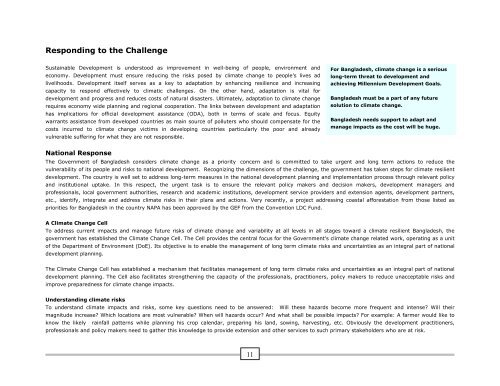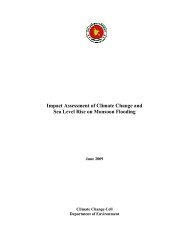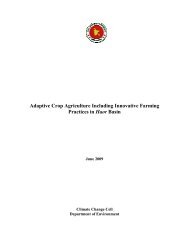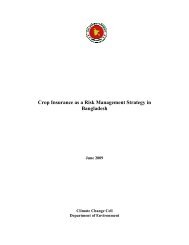CLIMATE CHANGE AND BANGLADESH
CLIMATE CHANGE AND BANGLADESH
CLIMATE CHANGE AND BANGLADESH
Create successful ePaper yourself
Turn your PDF publications into a flip-book with our unique Google optimized e-Paper software.
Responding to the Challenge<br />
Sustainable Development is understood as improvement in well-being of people, environment and<br />
economy. Development must ensure reducing the risks posed by climate change to people’s lives ad<br />
livelihoods. Development itself serves as a key to adaptation by enhancing resilience and increasing<br />
capacity to respond effectively to climatic challenges. On the other hand, adaptation is vital for<br />
development and progress and reduces costs of natural disasters. Ultimately, adaptation to climate change<br />
requires economy wide planning and regional cooperation. The links between development and adaptation<br />
has implications for official development assistance (ODA), both in terms of scale and focus. Equity<br />
warrants assistance from developed countries as main source of polluters who should compensate for the<br />
costs incurred to climate change victims in developing countries particularly the poor and already<br />
vulnerable suffering for what they are not responsible.<br />
For Bangladesh, climate change is a serious<br />
long-term threat to development and<br />
achieving Millennium Development Goals.<br />
Bangladesh must be a part of any future<br />
solution to climate change.<br />
Bangladesh needs support to adapt and<br />
manage impacts as the cost will be huge.<br />
National Response<br />
The Government of Bangladesh considers climate change as a priority concern and is committed to take urgent and long term actions to reduce the<br />
vulnerability of its people and risks to national development. Recognizing the dimensions of the challenge, the government has taken steps for climate resilient<br />
development. The country is well set to address long-term measures in the national development planning and implementation process through relevant policy<br />
and institutional uptake. In this respect, the urgent task is to ensure the relevant policy makers and decision makers, development managers and<br />
professionals, local government authorities, research and academic institutions, development service providers and extension agents, development partners,<br />
etc., identify, integrate and address climate risks in their plans and actions. Very recently, a project addressing coastal afforestation from those listed as<br />
priorities for Bangladesh in the country NAPA has been approved by the GEF from the Convention LDC Fund.<br />
A Climate Change Cell<br />
To address current impacts and manage future risks of climate change and variability at all levels in all stages toward a climate resilient Bangladesh, the<br />
government has established the Climate Change Cell. The Cell provides the central focus for the Government’s climate change related work, operating as a unit<br />
of the Department of Environment (DoE). Its objective is to enable the management of long term climate risks and uncertainties as an integral part of national<br />
development planning.<br />
The Climate Change Cell has established a mechanism that facilitates management of long term climate risks and uncertainties as an integral part of national<br />
development planning. The Cell also facilitates strengthening the capacity of the professionals, practitioners, policy makers to reduce unacceptable risks and<br />
improve preparedness for climate change impacts.<br />
Understanding climate risks<br />
To understand climate impacts and risks, some key questions need to be answered: Will these hazards become more frequent and intense? Will their<br />
magnitude increase? Which locations are most vulnerable? When will hazards occur? And what shall be possible impacts? For example: A farmer would like to<br />
know the likely rainfall patterns while planning his crop calendar, preparing his land, sowing, harvesting, etc. Obviously the development practitioners,<br />
professionals and policy makers need to gather this knowledge to provide extension and other services to such primary stakeholders who are at risk.<br />
11





